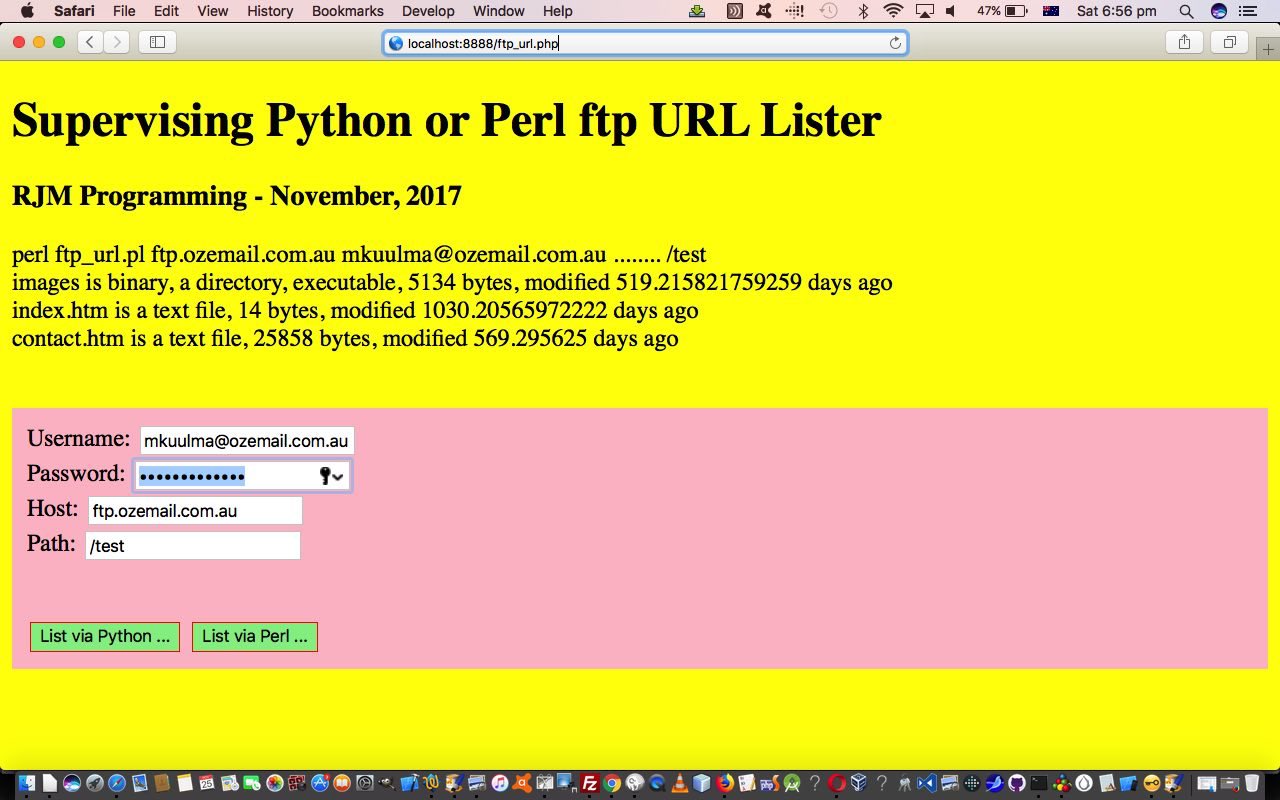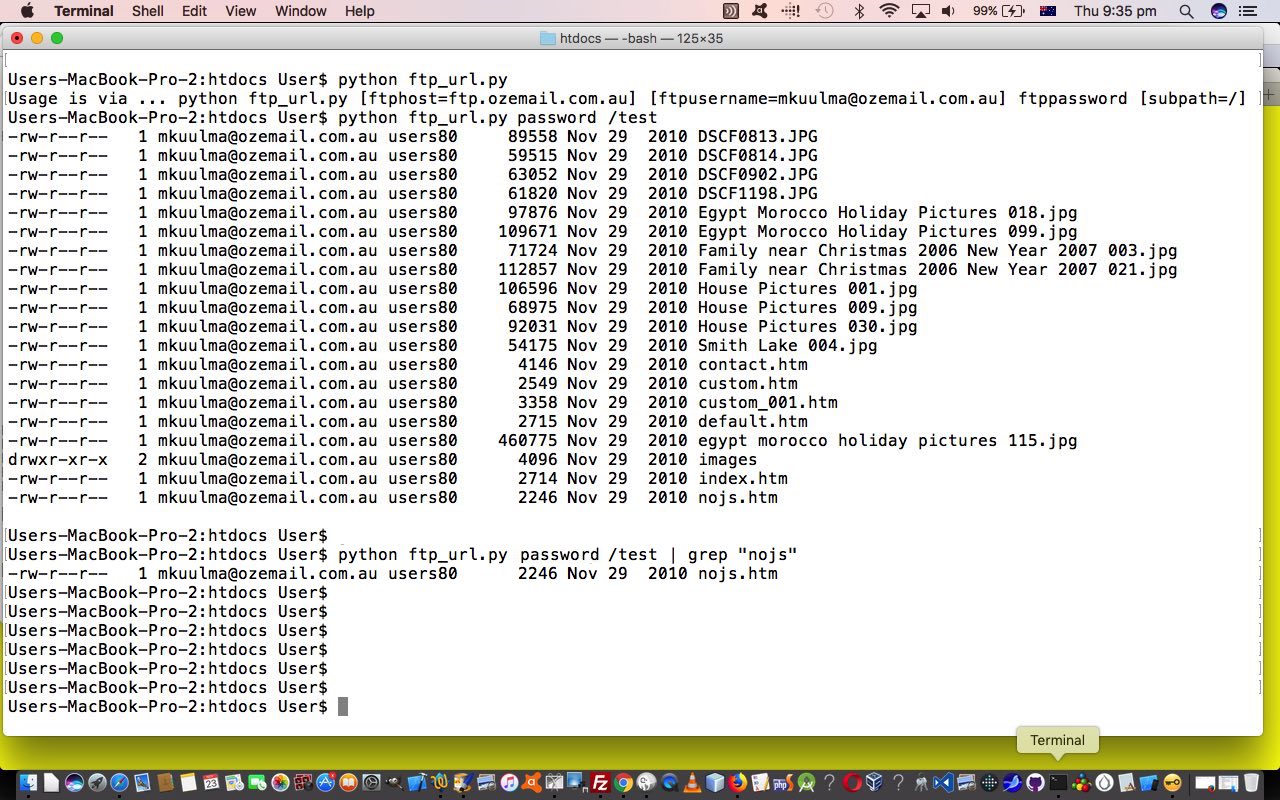Yesterday’s Python ftp Primer Tutorial is given a “return of the Three Ps” feel today. Yes, we code some Perl to do similar ftp listing logic as we did with Python yesterday, so that …
- PHP supervises ftp listing functionality provided by either …
- Python … or …
- Perl … and this new Perl code is …
#!/usr/bin/perl
# ftp_url.pl
# Ftp URL listing
# RJM Programming
# November, 2017
# Thanks to https://www.foo.be/docs/tpj/issues/vol1_3/tpj0103-0007.html
use Net::FTP;
#use File::Listing qw(parse_dir);
# Create a new connection to the ftp server
sub connection { # Create a new NET::FTP object
$ftp = Net::FTP->new($CPANhost, Timeout => 60)
or die "Can't contact $CPANhost: $!";
# We shall login to the ftp server as anonymous;
$ftp->login($CPANusername,$CPANpassword)
or die "Can't login ($CPANhost):" .
$ftp->message;
# Change the working directory
$ftp->cwd($CPANpath) or die
"Can't change directory ($CPANhost):".
$ftp->message;
return $ftp;
}
# The path to the CPAN/modules directory on most CPAN hosts
$CPANpath = '/';
$CPANusername = 'mkuulma@ozemail.com.au';
$CPANpassword = '';
# Change this to the name of your nearest CPAN host
$CPANhost = '';
my $size = @ARGV;
if ($size == 2) {
$CPANhost = 'ftp.ozemail.com.au';
$CPANpath = $ARGV[1];
$CPANpassword = $ARGV[0];
} else {
if ($size == 1) {
$CPANhost = 'ftp.ozemail.com.au';
$CPANpassword = $ARGV[0];
} else {
if ($size == 3) {
$CPANhost = $ARGV[0];
$CPANusername = $ARGV[1];
$CPANpassword = $ARGV[2];
} else {
if ($size == 4) {
$CPANhost = $ARGV[0];
$CPANusername = $ARGV[1];
$CPANpassword = $ARGV[2];
$CPANpath = $ARGV[3];
} else {
print "Usage is via ... perl ftp_url.pl [ftphost=ftp.ozemail.com.au] [ftpusername=mkuulma@ozemail.com.au] ftppassword [subpath=/]\n";
}
}
}
}
if ($CPANpassword eq '') {
$CPANpassword = '';
} else {
# Create the initial connection
$ftp = connection();
$ftp->pasv(); # passive mode
# Retrieve a recursive directory listing
my @ls = $ftp->ls('-l');
for my $filex (@ls) {
my $file = $filex;
my (@description, $size);
if (-e $file) {
push @description, 'binary' if (-B _);
push @description, 'a socket' if (-S _);
push @description, 'a text file' if (-T _);
push @description, 'a block special file' if (-b _);
push @description, 'a character special file' if (-c _);
push @description, 'a directory' if (-d _);
push @description, 'executable' if (-x _);
push @description, (($size = -s _)) ? "$size bytes" : 'empty';
push @description, (($daysago = -M _)) ? " modified $daysago days ago" : '';
print "\n\t$file is ", join(', ',@description),"";
}
}
print "\n\t";
}
… or you can download it as ftp_url.pl (supervised by ftp_url.php changed in this way, where you may notice multiple HTML input type=submit buttons used to differentiate the two strands of ftp functionality modes).
With this Perl coding we again use command line arguments as the technique to handle user defined data to define the ftp connection.
Think server side languages, think “The Three Ps”!
Previous relevant Python ftp Primer Tutorial is shown below.
Python is a great server side language to learn. Some web server configurations use it as their “go to” server language, though ours here at rjmprogramming.com.au uses PHP (and so we’ve written a PHP “supervisor” to dovetail with today’s Python code).
We’re going to write this Python code, that facilitates the listing of an ftp URL “path”, to run as if from a Linux (or Mac OS X, which we tested with for the work today) command line.
So, underlying the PHP supervisory live run today, the hard working “duck child” Python goes like …
"""
ftp_url.py - RJM Programming - November 2017
Show some ftp functionality ... thanks to Python & XML by O'Reilly ISBN: 0-596-00128-2
"""
import sys
from urllib import urlopen
def main(argv):
if len(sys.argv) == 5:
fd=urlopen("ftp://" + sys.argv[2] + ":" + sys.argv[3] + "@" + sys.argv[1] + sys.argv[4])
else:
if len(sys.argv) == 4:
fd=urlopen("ftp://" + sys.argv[2] + ":" + sys.argv[3] + "@" + sys.argv[1])
else:
if len(sys.argv) == 3:
fd=urlopen("ftp://mkuulma@ozemail.com.au:" + sys.argv[1] + "@ftp.ozemail.com.au" + sys.argv[2])
else:
if len(sys.argv) == 2:
fd=urlopen("ftp://mkuulma@ozemail.com.au:" + sys.argv[1] + "@ftp.ozemail.com.au")
else:
print "Usage is via ... python ftp_url.py [ftphost=ftp.ozemail.com.au] [ftpusername=mkuulma@ozemail.com.au] ftppassword [subpath=/]"
exit()
print fd.read()
exit()
if __name__ == "__main__":
main(sys.argv[1:])
… or you can download it as ftp_url.py (supervised by ftp_url.php).
Interesting, huh?!
If this was interesting you may be interested in this too.
If this was interesting you may be interested in this too.




